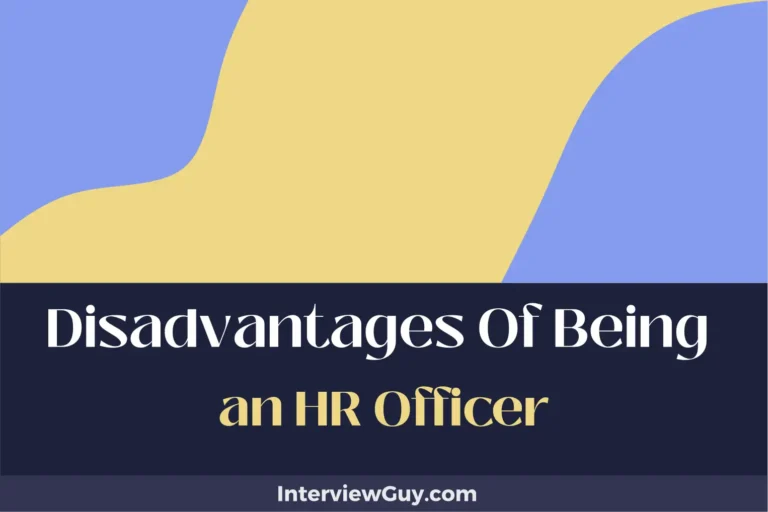25 Disadvantages of Being a Business Development Director (Perils of Power!)

Considering a career in Business Development?
It’s easy to be lured in by the enticing aspects:
- Opportunity to shape a company’s strategic direction.
- Potential for high earnings.
- The thrill of securing lucrative deals and partnerships.
However, there’s more to it than meets the eye.
Today, we’re delving deeper. Much deeper.
Into the challenging, the daunting, and the strenuous aspects of being a Business Development Director.
Steep learning curve? Absolutely.
Substantial initial time investment? Indeed.
Stress from managing diverse stakeholder expectations? Undoubtedly.
And we can’t overlook the volatility of the business environment.
So, if you’re contemplating a leap into Business Development, or just curious about what’s beyond those successful contracts and negotiations…
Keep reading.
You’re about to get a comprehensive insight into the disadvantages of being a Business Development Director.
Intense Pressure to Meet Growth and Revenue Targets
Business Development Directors are often under substantial pressure to meet growth and revenue targets.
The success of the company largely depends on their ability to identify and capitalize on new business opportunities.
If the company’s growth stagnates or revenue decreases, the responsibility often falls on the Business Development Director.
This can lead to high levels of stress and long hours at work, particularly during critical business periods or when the company is not meeting its financial objectives.
Despite these challenges, this role can also be incredibly rewarding, especially when the business successfully expands or achieves its financial goals.
Long and Irregular Working Hours Due to Global Clientele
Business Development Directors often have to deal with long and irregular working hours due to their interactions with global clientele.
As they communicate with clients and partners from different time zones, they may have to schedule meetings or calls outside of traditional office hours.
This could mean taking a conference call late at night or early in the morning.
While this can be beneficial for creating and maintaining international relationships, it can also mean sacrificing personal time and disrupting the work-life balance.
It may also lead to stress and fatigue, which can impact overall performance and productivity.
Additionally, as the role demands constant innovation and the ability to respond quickly to changing market conditions, it often requires a significant time commitment, further extending the working hours.
High Stress from Constantly Evolving Market Conditions
As a Business Development Director, one significant disadvantage is the high stress level resulting from constantly changing market conditions.
This role is often at the forefront of the company’s growth and expansion efforts, which means they are directly impacted by fluctuations in the market.
They must stay updated with industry trends, competitor activity, consumer behavior, and economic indicators to make informed strategic decisions.
Business Development Directors are also responsible for achieving ambitious growth targets, which can add to the stress if the market conditions are unfavorable.
Additionally, since they often work on projects that determine the future direction of the company, there is a high level of responsibility and pressure associated with their decisions.
This constant need to adapt and respond to market changes can lead to long hours and significant stress, which can negatively impact work-life balance.
Need for Frequent Travel, Potentially Impacting Work-Life Balance
Business Development Directors often find themselves traveling frequently for work.
This can include domestic or international travel, depending on the scope of the company.
While traveling for work can provide opportunities to meet new people and explore new places, it can also be draining and time-consuming.
The need to be away from home often can disrupt the work-life balance, as it may impact personal relationships and limit time spent on personal pursuits.
Additionally, constant traveling can lead to physical and mental fatigue, which may affect job performance and overall health.
Despite these challenges, the ability to adapt to new environments and cultures can be advantageous in this role.
Difficulty in Maintaining Sustainable Business Partnerships
Business Development Directors are often tasked with the responsibility of establishing and maintaining long-term business partnerships.
However, this can be a challenging task considering the unpredictable nature of the business world.
Partnerships may fall through due to unforeseen circumstances, such as changes in the partner company’s management, financial struggles, or shifting business strategies.
Additionally, the competitive business environment may strain partnerships, as organizations often have to prioritize their own interests.
These challenges can make it difficult to maintain sustainable partnerships, which are crucial for business growth and expansion.
Hence, the role of a Business Development Director can involve high levels of stress and uncertainty.
Risk of Failure in Securing New Business Opportunities
As a Business Development Director, one of your main tasks is to identify and secure new business opportunities.
This involves strategic planning, market research, and negotiations.
However, not every opportunity will result in a successful business deal.
The market is unpredictable and competition can be fierce, which means that despite your best efforts, some business opportunities may not materialize.
This can be discouraging and stressful, especially if your company is depending on these new ventures for growth.
Additionally, constant failure in securing new business can reflect poorly on your performance, even if the reasons are beyond your control.
This risk of failure is a significant disadvantage for those in the role of a Business Development Director.
Ever-Present Competition from Other Firms and Business Development Directors
Business Development Directors constantly face competition from their counterparts in other firms.
They are always in a race to identify and exploit new market opportunities before their competitors do.
This competition also extends to winning and retaining clients, as well as attracting and securing top talent to their teams.
The intense competition often leads to high-stress levels, long work hours, and the constant pressure to perform and deliver results.
Furthermore, the industry’s ever-changing nature requires them to stay updated with the latest business trends and technologies, adding to the burden of their responsibilities.
This can be a significant disadvantage to those who struggle with stress management or maintaining a healthy work-life balance.
Responsibility for Large Teams and Multifaceted Projects
As a Business Development Director, you are often in charge of managing large teams and overseeing multiple projects simultaneously.
This can be a significant burden, as you are responsible for ensuring each team member is performing their duties effectively and that each project is progressing smoothly.
This requires excellent organizational skills and the ability to multitask.
When things go wrong, it is often the Business Development Director who is held accountable.
This immense responsibility can lead to high levels of stress and long working hours.
Additionally, managing a large team often involves dealing with interpersonal conflicts and other issues that can arise in a team setting.
This can be draining and time-consuming, detracting from the time available to focus on strategic planning and execution.
Challenge of Adapting to New Industries or Markets
Business Development Directors often have to navigate various industries and markets, which can be a major challenge.
They must stay informed about new trends and advancements, as well as understand and anticipate the needs of different markets.
This requires extensive research and a deep understanding of various industries, which can be time-consuming and mentally exhausting.
Moreover, misinterpretation or lack of understanding of a particular market can result in serious business losses.
For example, a business strategy that worked well in one industry may not necessarily be successful in another.
Therefore, the Business Development Director must be adept at learning quickly and adapting strategies to fit different contexts, which can be a stressful and demanding process.
Constant Need to Innovate and Stay Ahead of Industry Trends
As a Business Development Director, you must continuously innovate and stay updated with industry trends.
The business environment is dynamic, with new trends, technologies, and competitor strategies emerging regularly.
This role requires you to be on your toes, always looking for new opportunities, and identifying potential threats.
This can be stressful and time-consuming as it involves constantly learning, adapting, and integrating new strategies into your business development plans.
Not being able to keep up with industry trends can result in missed opportunities and can negatively impact the company’s growth.
It’s a vital part of the job, but it can also be a significant source of pressure and work overload.
Difficulties in Measuring the Impact of Business Development Efforts
Business Development Directors are tasked with planning and executing strategies to increase company revenue, identify potential new markets, and lead efforts to engage and retain existing clients.
However, one of the major challenges they face is the difficulty in measuring the impact of their business development efforts.
Unlike other roles where success can be quantified by specific metrics such as sales volume or number of new clients, the effects of business development initiatives are often intangible and take time to manifest.
For instance, a new partnership or market entry may not immediately translate to increased profits, but may lay the groundwork for significant growth in the future.
The lack of immediate, measurable results can sometimes lead to under-appreciation of the role and make it challenging to justify the resources invested in these initiatives.
This requires the Business Development Director to have a long-term vision and the ability to communicate the potential benefits of their work effectively to stakeholders.
Requirement to Keep Up with Rapid Technological Advances
Business Development Directors are expected to keep pace with rapidly advancing technology.
This can mean constant learning and adaptation, which may be time-consuming and challenging.
The role often requires familiarity with the latest software, digital marketing tools, and data analysis techniques.
In addition, the director may need to stay updated on emerging trends and innovations in their industry.
Any failure to keep up with these technological advancements can lead to ineffective strategies and a loss of competitive advantage.
It may also put them in a position where they are unable to make informed decisions that drive business growth.
Thus, this constant requirement to stay updated can add to the pressures of the role.
Reliance on Networking and Relationship Building, Which Can Be Time-Consuming
The role of a Business Development Director often heavily relies on networking and relationship building.
This involves a considerable investment of time and effort in attending industry events, meetings, and conferences to establish new contacts and maintain existing ones.
More than just casual meetups, these interactions require careful planning, follow-ups, and consistent communication.
Moreover, relationship building is not an instantaneous process; it involves nurturing trust and rapport over an extended period, sometimes years.
This constant interaction and the need to be always approachable and available can be stressful and time-consuming, often extending beyond typical working hours.
It can also lead to a work-life imbalance, as the demands of networking can often spill into personal time.
However, these relationships can lead to potential partnerships and opportunities for the business.
Potential for Misalignment with Company Strategy or Vision
The role of a Business Development Director involves making strategic decisions and laying out growth plans for a business.
However, there can be a potential for misalignment with the overall company’s strategy or vision.
This typically happens when there’s a lack of communication or understanding between the executive management team and the business development team.
Misaligned strategies can lead to ineffective business development initiatives, wasted resources, and potential damage to the company’s reputation.
Furthermore, when the company’s direction isn’t clearly communicated or understood, it can result in the implementation of strategies that diverge from the company’s objectives.
This not only affects the performance of the business development team but can also have a broader impact on the overall organization.
Risk of Reputation Damage From Unsuccessful Deals or Partnerships
In the role of a Business Development Director, there’s a high risk of reputation damage from unsuccessful deals or partnerships.
As the individual responsible for creating and implementing strategic plans to grow a business, a significant part of the role involves building relationships and securing deals with potential partners.
If these deals or partnerships turn out to be unsuccessful, it can reflect poorly on the Business Development Director.
This could lead to a loss of credibility with current and future partners, and might make it more difficult to secure successful deals in the future.
Furthermore, if the unsuccessful deal or partnership leads to a significant loss for the company, it could have serious consequences for the Business Development Director’s career progression and job security.
Therefore, this role requires a careful and strategic approach to deal-making, with a focus on long-term success and sustainability.
Need for Exceptional Communication and Negotiation Skills
Business Development Directors are required to have outstanding communication and negotiation skills.
They have to communicate with various stakeholders, ranging from team members to potential clients.
This means they need to be able to articulate their ideas clearly, listen effectively, and understand others’ perspectives.
Additionally, they often have to negotiate deals or contracts, which requires the ability to understand and leverage complex information.
This high level of communication and negotiation can be stressful and challenging for some individuals.
Moreover, the outcomes of these negotiations and communications can greatly affect the success of the business, adding another layer of pressure to the role.
Managing the Conflict Between Short-Term Gains and Long-Term Strategy
Business Development Directors often face the challenging task of balancing short-term gains with long-term strategic planning.
In the pursuit of immediate profitability and growth, they might have to make decisions that can bring quick results, but these could possibly contradict the long-term strategic goals of the organization.
This could involve choices like investing heavily in a potentially lucrative but risky market, or prioritizing short-term sales over building long-lasting relationships with clients.
The pressure to deliver immediate results can lead to stress, as their role involves a constant juggling between meeting targets and maintaining the overall strategic direction of the business.
Making the wrong decision can have significant repercussions on their career as well as the future of the company.
Balancing Quality and Quantity When Generating Leads
A significant challenge for Business Development Directors is striking the right balance between the quantity and quality of leads generated.
This role often requires aggressive strategies to meet the high demand for new business leads and opportunities.
However, focusing too much on the quantity can lead to under-qualified leads that may not convert into actual business deals, wasting resources in the process.
On the other hand, pursuing only a few high-quality leads may not suffice to meet the growth expectations of the company.
This constant balancing act can lead to high stress and pressure on the Business Development Director to deliver results.
Legal and Ethical Compliance in Deals and Partnerships
Business Development Directors play an essential role in forging new business relationships and maintaining existing partnerships.
However, one of the challenges they often face is ensuring that all deals, partnerships, and other business activities align with legal requirements and ethical standards.
They are tasked with navigating complex legal contracts, negotiating business deals, and ensuring the company is not put at risk of legal action.
Mistakes or oversights in this area can lead to significant consequences, including financial penalties, damaged business relationships, and harm to the company’s reputation.
Furthermore, they also face the challenge of ensuring that every business deal or partnership aligns with the ethical standards of the company and its stakeholders, which can often add another layer of complexity to their role.
These factors can make their role stressful and demanding, requiring a high level of attention to detail and understanding of legal and ethical issues in business.
Overseeing Budgets and Justifying Development Expenditures
As a Business Development Director, you will be responsible for overseeing and managing budgets, which can often be a complex and stressful process.
This role requires you to monitor the allocation of funds, analyze financial data, and make crucial decisions about investments and cost-cutting.
You would also need to justify any spending on development projects, a task that can be difficult especially if the return on investment isn’t immediate or obvious.
It requires a deep understanding of the business and a keen eye for details to make sure every dollar spent is contributing to the growth and success of the company.
This can be a demanding and high-pressure job, especially in times of financial uncertainty or constraint.
Pressure to Quickly Understand and Capitalize on Market Data
In the role of a Business Development Director, there is a significant amount of pressure to quickly understand and capitalize on market data.
This role requires you to consistently stay on top of market trends, consumer behaviors, and competitor activities, and use this data to inform business strategies.
Not only do you need to understand this information, but you also need to be able to interpret it in a way that can be leveraged for growth.
This means making quick, but informed decisions, which can be stressful and challenging.
This pressure is increased by the fact that the success of the business heavily relies on these strategic decisions.
This can lead to long hours of research, analysis, and planning, and a high-stress work environment.
Strain of Continuously Delivering Creative and Effective Sales Pitches
As a Business Development Director, one of the main duties is to drive new business through creative sales pitches.
This requires constant creativity and innovation, which can be mentally exhausting.
The pressure to continuously deliver unique and effective sales pitches can lead to stress and burnout.
In addition, the success of these pitches often determines the financial success of the company, adding to the pressure.
The strain of such responsibilities can result in long hours and weekend work, compromising work-life balance.
Despite this, the role provides an opportunity to directly contribute to the growth of the company and can be rewarding for those who thrive in a challenging, high-stakes environment.
Need to Stay Resilient and Positive Despite Rejections or Setbacks
Business Development Directors have the task of identifying and securing business opportunities.
This often requires presenting proposals and negotiating deals, which means they face the possibility of rejection on a regular basis.
The process can be quite discouraging, especially when a lot of time, effort, and resources have been invested in a proposal that gets turned down.
However, it is critical for these professionals to remain resilient and positive, and use each setback as a learning experience for future endeavors.
This can put a considerable amount of pressure on the individual, as they must constantly manage their emotions and maintain a positive outlook in the face of adversity.
This can lead to stress and burnout if not properly managed.
Ensuring Team Alignment With Overall Business Goals
As a Business Development Director, one of the major challenges is ensuring that the entire team is in alignment with the company’s overall business goals.
This role often requires managing a diverse team with differing skill sets, experiences and perspectives, which can sometimes lead to conflicts or misunderstandings.
Ensuring that everyone is on the same page and working towards the same objectives can be a daunting task, requiring excellent communication, leadership, and management skills.
This role may also require the director to balance the needs and goals of various departments, which can sometimes result in difficult decision making and potential dissatisfaction among team members.
This can be further complicated when the business goals or strategies change, requiring the director to realign the team with the new objectives.
This constant need for alignment and readjustment can be both time-consuming and stressful.
Dealing with the Complexity of Multifaceted Business Deals and Contracts
As a Business Development Director, you’ll often be at the forefront of negotiating and managing complex business deals and contracts.
These agreements can involve multiple parties, intricate legal terms, and extensive financial implications.
This complexity can create a high-stress environment and require a significant investment of time and energy to ensure every detail is thoroughly understood and managed.
Additionally, the stakes are often high – a poor decision or overlooked detail could potentially result in significant financial loss or damage to the company’s reputation.
Moreover, the pressure to constantly secure profitable deals can create a persistent sense of stress and urgency.
This role requires excellent attention to detail, strong negotiation skills, and a deep understanding of business law and financial management.
Conclusion
And so, we conclude.
This is an unvarnished examination of the trials and tribulations of being a Business Development Director.
It’s not all about slick presentations and high-profile corporate meetings.
It’s about perseverance. It’s about commitment. It’s about navigating the complex web of strategic planning and market competition.
But it’s also about the satisfaction of securing a lucrative deal.
The exhilaration of witnessing a business grow and prosper.
The gratification of knowing you played a pivotal role in a company’s success.
Yes, the journey is arduous. But the rewards? They can be astounding.
If you find yourself nodding, thinking, “Yes, this is the challenge I’ve been seeking,” we’ve got something more for you.
Take a look at our exclusive guide on the reasons to be a Business Development Director.
If you’re prepared to face both the peaks and valleys…
To learn, to evolve, and to prosper in this dynamic role…
Then perhaps, just perhaps, a career in business development is for you.
So, make the leap.
Explore, engage, and excel.
The world of business development awaits.
AI’s Dead End: Jobs That Require the Human Touch
Rising to the Top: The Most In-Demand Jobs of the Modern Age
Eccentrically Exciting: The Weirdest Jobs in the World
Low Pay, High Stress: Uncovering the Least Rewarding Jobs in the Current Economy






